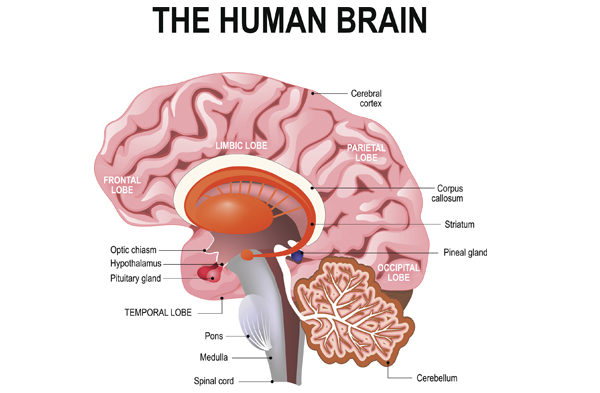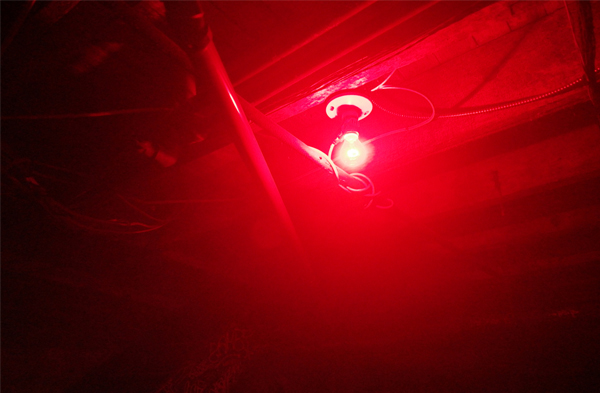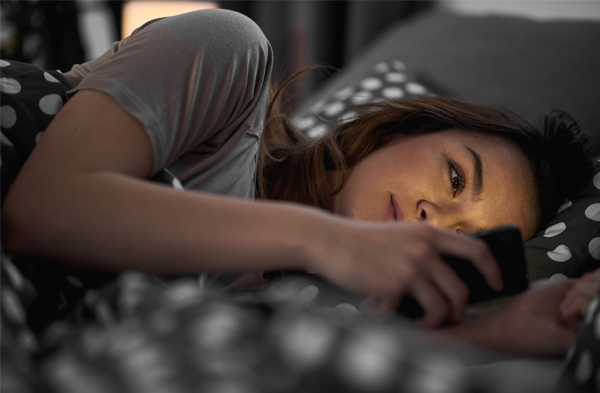Why does blue light affect our sleep patterns?
If you’ve read any of my previous blogs, you’ll know that I’m not a big fan of using devices like smartphones, tablets or laptops before bed and usually, I’ll cite blue-light as the reason why. But what is this blue light and why does it have such a detrimental impact on your sleep patterns? To answer this question, first we have to take a look at the role of light when it comes to your circadian rhythm.
As you may already know, your circadian rhythm refers to the idea of an internal biological clock that governs your sleep/wake cycle. This internal clock is in part controlled by your Superchiasmatic nucleus (SCN), a collection of nerves located in a region of your brain known as the hypothalamus. This part of your brain sits very close to your optic nerves so, unsurprisingly, a lot of communication happens between these two areas.

Now let’s take a closer look at your eyes, or more specifically, your retina. Your retina is a thin layer of tissue composed of photoreceptor cells, that sits at the back of your eyes and its job is to receive light and convert it into neural signals that your brain can use for visual recognition. One particular photoreceptor cells plays a very important role when it comes to light and your circadian clock – melanopsin.
Melanopsin is a very light sensitive protein that can detect the intensity of light but only a very specific type of light. Normal light levels, for example, are unlikely to stimulate your melanopsin cells but extremely bright light sources, such as sunlight will trigger a response. When your melanopsin cells pick up bright light they will in turn send a message to your SCN, activating your circadian rhythm to stimulate feelings of wakefulness. When melanopsin doesn’t detect light, the SCN will encourage the release of melatonin, the sleep hormone.1
However, sunlight isn’t the only form of light that your melanopsin cells are sensitive too – they’re also extremely sensitive to blue light waves which was never a problem in human history until the dawn of modern technology – the computer!
You see a very specific form of blue light, sometimes known as cyan, acts as a secondary colour in the RGB colour model, a combination of red, green and blue light that is utilised to construct all the colours you seen on your computer and television screens. This means that for the first time human being are being exposed to blue-light waves at night in their homes which will definitely provoke a reaction from your melanopsin cells, stimulating the release of hormones such as cortisol.
Which colour of light is good for sleep?

Okay, so blue light isn’t very good for your sleep patterns but are there any colours of light that are? Well, according to a recent animal trial conducted by the University of Ohio, published in the Journal of Neuroscience, red light might be the best option if you really do have to have a night light whilst sleeping.
The study, which involved exposing hamsters to various light waves, found that blue light, or even dim white light had the power to change the hamsters’ mood. Total darkness was still the best option but red light did not have as much of an impact as other light waves.2 Of course, hamsters are naturally nocturnal and more human studies would need to take place before this could be ascertained.
However, there is another study that has found similar results. This time the study focused on female basketballs players and was conducted by the China Institute of Sport Science in Beijing. It looked to determine the effect of red light on sleep quality and endurance performance. The conclusion of this study was optimistic, finding that red light did positively affect sleep quality.3
What can you do to avoid the dark side of blue light?
Blue light can undoubtedly have an impact on your quality of sleep which in turn can affect many different areas of your body, from your mood to your weight! But, in a world dominated by screens, what can you do to avoid blue light? Well, the good news is that as we’ve become savvier to blue light, technology seems to be trying to provide a solution.

Invest in sleep mode apps
I can sit here and talk all day about the dangers of using your smartphone in bed but in reality, it’s difficult to resist temptation. While scrolling through social media at midnight has its own set of problems, a number of apps are popping up that aim to deal with the problem of blue light.
One example is Night Shift, a setting available on iPhones and other apple devices. This setting uses the clock and geolocation of your IOS device to determine when it’s sunset in your location and then shifts the colours of your display accordingly to the warmer end of the spectrum, making it easier on your eyes.4
Consider red bulbs
If you’ve ever had to get out of bed at night to answer the call of nature, the chances are you’ve stumbled your way to the bathroom, blinded by a flare of white light. You may have noticed that when you do eventually return to your bed, you feel more roused than before and find it difficult to drift off. Fortunately, there is now an answer to this conundrum.
I mentioned earlier that red light is a kinder option when it comes to sleep when compared to blue and white lights. Fortunately, some companies out there have also cottoned on to this idea and now producing red LED spectrum bulbs to help combat the issue of blue-white light invading your bedroom at night. SCS Lighting Sleep-Ready Light is one such product, offering a LED amber bulb that can help to support your production of melatonin, emitting only very low levels of blue light.
Use sunrise alarm clocks
As I discuss in my blog, ‘Stop hitting snooze! 6 ways to feel more refreshed in the morning,’ starting your day by wrestling with the alarm on your smartphone doesn’t always set you up in good stead. In fact, the sudden onslaught of blue-light can rouse you too quickly out of sleep, leaving you feeling tired and groggy for the rest of the day.
Rather than working with your circadian rhythm, it works against it, which is the complete opposite from a more natural alarm such as a sunrise alarm clock. Instead of relying on vibrations, bright light and a catchy ringtone, a sunrise alarm clock gently filters light into your bedroom over the course of half an hour, allowing you to wake up gradually rather than all at once.
Such options are now widely available and can be reasonably priced, so I’d definitely make sure you try checking them out!
1https://bigpictureeducation.com/proteins-eye
2https://www.huffingtonpost.com/2013/08/07/blue-light-depressive-symptoms-hamsters-_n_3709273.html








